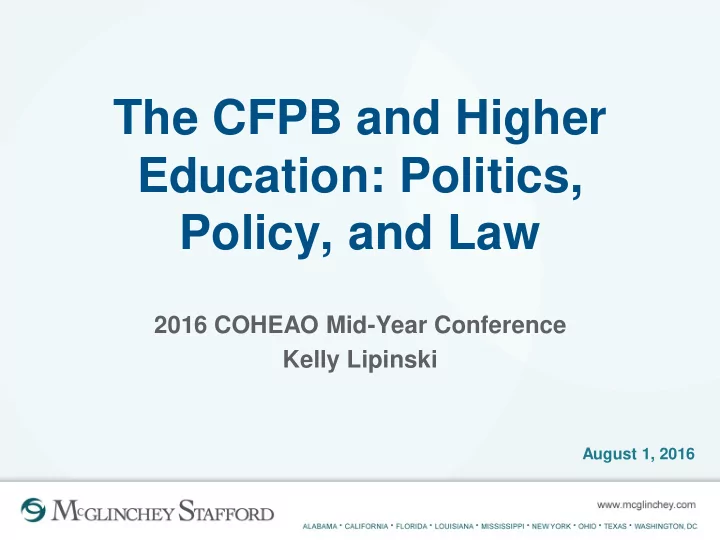

The CFPB and Higher Education: Politics, Policy, and Law 2016 COHEAO Mid-Year Conference Kelly Lipinski August 1, 2016
Vicarious Liability • Director Cordray’s remarks on how to “hold a company accountable.” • Another company may be responsible for the conduct of another when the third-party is acting as the company’s agent or at its direction. – Ace Cash Express Consent Order (collection activities of third-party collectors) – Sprint Consent Order (payment processors). • Reliance on unfair, deceptive, or abusive acts and practices authority.
Discover Bank Consent Order • Discover Bank Consent Order (July 22, 2015). – Failure to furnish clear information about interest paid. 12 U.S.C. § 1031. – Initiating collection calls at inconvenient times. 12 U.S.C. § 1031. – Overstating the minimum amount due. 12 U.S.C. § 1031. – Violating the FDCPA with respect to accounts it acquired that were in default (which the CFPB defined to be charge-off status). 15 U.S.C. § 1692.
Discover Bank Consent Order • Discover acquired Citibank’s private loan business (approx. 800,000 accounts). • Retained many of Citibank’s servicing policies. • $25 million civil penalty, compensation to consumers.
Discover Bank Consent Order • Discover required students to submit a W- 9S before the bank would file appropriate interest documents with the IRS. • Requirement was disclosed in the paper billing statements, but did not appear in online billing statements. • Borrowers who did not submit the form would see “$0” qualified interest payments, which was incorrect.
Discover Bank Consent Order • Borrowers whose loans were leaving their grace period received incorrect billing statements. – Amounts owed on loans leaving grace – Interest owed on loans still in deferment • Affected approximately 30,000 account statements for 7,000 borrowers. • Issue appears limited to the former Citibank loans.
Discover Bank Consent Order • Borrowers’ cell phone corresponds to one time zone, address corresponds to another. • Discover called time zone associated with cell phone, which was “inconvenient” in other time zone. • CFPB’s FDCPA proposal under consideration would address this practice. Call only during times that are not “inconvenient” in both time zones.
Discover Bank Consent Order • Of the 800,000 accounts, many were past due or charged-off. • Discover placed most of these charged-off accounts with collection agencies; retained 252 charged-off accounts • These accounts were governed by the FDCPA, yet Discover failed to send the validation notice in the first communication. • Accounts represented 0.3% of the portfolio.
Outline of FDCPA Rule • On July 27, 2016, the CFPB released an outline of its proposed FDCPA rules that are under consideration. – Small Business Review Panel – FDCPA debt collectors • Outline for creditors is expected in a few months.
Outline of FDCPA Rule • Notable Proposals under Consideration – Debt substantiation – Data integrity – Validation notice and Statement of Rights – Collection communications – Time-barred debt and obsolete debt
CFPB Mid-Year Report on Student Loan Complaints • The volume of complaints continues to increase. – Up 34% from prior period – 3,100 in six months • Cosigner release. • Auto-default language. • Roadblocks to refinance.
CFPB Mid-Year Report: Cosigner Release • CFPB believes borrowers are not aware they are eligible for the benefit. • Over 90% of borrowers who apply are denied. – Criteria is unclear – Received other benefit, forbearance, without understanding this would permanently bar them from cosigner release • CFPB wants servicers to clearly state the required factors, proactively notify borrowers when eligible, and warn certain actions can result lead to disqualification.
CFPB Mid-Year Report: Auto-Default Language • CFPB believes auto-default clauses continue to exist and continue to be enforced. • Auto-default clause in consumer credit agreements. This is when the Note defines the term “I” or “me” to refer to both the primary borrower and the cosigner. – Default section states – “I will be in default, and you will have right to demand the immediate repayment of the entire outstanding balance due under this Note, if I die or any bankruptcy proceeding is filed by or against me.” • Lenders assert the clauses are being removed from notes and won’t be enforced. • Loans are sold and securitized; investors are not honoring this position. • Risk with leveraging old note template for refinance programs.
CFPB Mid-Year Report: Roadblocks to Refinance • Servicers and lenders are not quick enough for the CFPB and borrowers. • Payoff amounts are inaccurate or never received. • Cosigners who send a payment, to be applied to a specific loan, allege directions are not honored.
Accrediting Council for Independent Schools • The District Court for D.C. denied the CFPB’s petition to enforce a civil investigative demand. • The CID requested Accredited Council provide information to the CFPB as to how it determined to accredit certain high-profile for-profit education institutions.
Accrediting Council for Independent Schools • The judge acknowledged the CFPB was struggling to establish the parameters of its authority, but held the agency lacked the authority to investigate the process to accrediting for-profit schools. • Outrage from Washington and other stakeholders asserting the CID was an overreach because Accredited Council did not provide a financial service. • Director Cordray responded that Accredited Council was a covered person because it facilitated for-profit schools misleading consumers. • Accredited Council is subject to regulation by another agency, the Department of Education, and would have needed to furnish the forms in that channel. • Interesting power play between the two agencies and lack of collaboration. Long-standing posture at the CFPB that seems to pervade, others can’t do the job well.
Questions? Kelly Lipinski klipinski@mcglinchey.com 216.378.4969
Recommend
More recommend